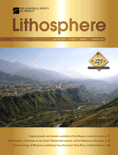
Lithosphere
Scope & Guideline
Unveiling the Mysteries of Our Planet's Lithosphere.
Introduction
Aims and Scopes
- Tectonic Processes:
Research on tectonic movements, fault systems, and their impact on landscape evolution, including studies of seismic activity and structural geology. - Geochemical Analysis:
Investigation into the geochemical processes affecting rock formation, mineralization, and the interactions between fluids and rocks, providing insights into resource exploration. - Petrology and Lithology:
Exploration of rock types, their formation processes, and characteristics, including studies on igneous, metamorphic, and sedimentary rocks. - Geophysical Methods:
Application of geophysical techniques such as seismic reflection, tomography, and magnetic studies to investigate subsurface structures and dynamics. - Hydrogeology and Reservoir Studies:
Focus on groundwater dynamics, reservoir characterization, and the impact of geological formations on fluid flow in subsurface environments. - Climate and Environmental Geology:
Research on the geological factors influencing climate change, including sedimentary responses to climatic shifts and anthropogenic impacts on geological processes.
Trending and Emerging
- Geomechanics and Rock Behavior:
Research into the mechanical properties and failure mechanisms of rocks, particularly under dynamic conditions, is increasingly prevalent, highlighting its importance in engineering and natural hazard assessment. - Hydraulic Fracturing and Tight Reservoirs:
A significant increase in studies related to hydraulic fracturing techniques and the characterization of tight oil and gas reservoirs indicates a growing interest in unconventional resource extraction. - Machine Learning in Geosciences:
The application of machine learning and artificial intelligence methods for data analysis and modeling in geological studies is emerging as a prominent theme, reflecting advancements in computational techniques. - Geothermal Energy and Sustainability:
Research on geothermal energy resources and their sustainable management is gaining momentum, aligning with global energy transition efforts and climate change mitigation strategies. - Integrated Geophysical Studies:
There is an increasing trend towards integrated geophysical approaches combining multiple techniques to provide comprehensive insights into subsurface structures and processes.
Declining or Waning
- Paleoclimate Studies:
Research focusing on ancient climate conditions and their geological implications has decreased, possibly due to a shift towards more contemporary climate issues. - Mineral Resource Exploration:
While still relevant, the volume of studies specifically targeting traditional mineral resource exploration is diminishing, as researchers explore alternative energy resources and sustainability. - Geological Remote Sensing:
The use of remote sensing technologies in geological studies appears to be less frequent, indicating a potential shift towards more ground-based observational methods. - Sedimentary Basin Analysis:
Although still a critical area, the specific focus on sedimentary basin studies has lessened, likely due to a broader interest in integrated geological systems.
Similar Journals
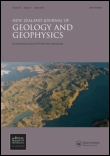
NEW ZEALAND JOURNAL OF GEOLOGY AND GEOPHYSICS
Deepening Understanding of Earth's Dynamic Systems.NEW ZEALAND JOURNAL OF GEOLOGY AND GEOPHYSICS, published by Taylor & Francis Ltd, stands as a prominent forum dedicated to the interdisciplinary exploration of geological and geophysical phenomena. With an impact factor that situates this journal in the prestigious Q1 category across key subjects—namely Earth and Planetary Sciences, Geology, and Geophysics—it is a critical resource for researchers, professionals, and students alike. The journal has been operational since 1958 and continues to contribute valuable insights into the complexities of the Earth's processes. Although it does not currently offer Open Access options, its broad readership benefits from an extensive archive of high-quality research findings that span from 1958 to 2024. Located in the United Kingdom, the journal remains a pivotal player in advancing the understanding of Earth's systems, making significant contributions to both academic inquiry and practical applications in the field.

China Geology
Your Gateway to Cutting-Edge Geological ResearchChina Geology, published by KEAI PUBLISHING LTD, is a leading open-access journal that serves as a pivotal platform for disseminating high-quality research across a wide spectrum of Earth sciences. Since its inception in 2018, the journal has rapidly established itself with an impressive Q1 ranking in multiple critical categories, including Geology, Economic Geology, and Oceanography, among others, reflecting its significant contribution to the academic community. Positioned as a top-tier journal in the Earth Planetary Sciences domain, it ranks #22 out of 321 in Geology and exhibits an admirable impact in sub-fields such as Earth-Surface Processes and Geochemistry and Petrology. China Geology is committed to promoting rigorous scientific inquiry and facilitating the open exchange of knowledge in the geosciences, making it an essential resource for researchers, professionals, and students eager to explore innovative developments and fundamental advances in geology. The journal’s accessibility ensures that critical findings reach a broad audience, thereby enhancing collaboration and driving forward scientific discourse in the global community.

GEOSCIENCES JOURNAL
Connecting Researchers to Tackle Environmental Challenges.Welcome to the GEOSCIENCES JOURNAL, a pivotal publication in the fields of Earth and Planetary Sciences and Environmental Science, proudly presented by the Geological Society of Korea. Established in 1997, this journal has become a prominent platform for researchers, professionals, and students, offering a rich collection of peer-reviewed articles that explore a diverse array of geoscientific topics. With an impressive Q2 ranking in both Earth and Planetary Sciences and Environmental Science categories for 2023, it stands as an essential resource in the academic community. Though it operates under a traditional subscription model, GEOSCIENCES JOURNAL remains dedicated to advancing knowledge through rigorous research. Addressed from its headquarters in Seoul, South Korea, the journal aims to foster a deeper understanding of geosciences, encouraging innovation and collaboration in tackling today’s environmental challenges.

Vestnik of Saint Petersburg University Earth Sciences
Championing Open Access in Earth SciencesVestnik of Saint Petersburg University Earth Sciences, published by ST PETERSBURG UNIV PRESS, serves as a pivotal platform for the dissemination of innovative research within the fields of Earth Sciences, Environmental Science, Geography, and Geology. This journal, with an ISSN of 2541-9668 and an E-ISSN of 2587-585X, aims to foster scholarly communication and facilitate advancements in understanding the diverse and complex interactions within our planet's systems. Operating from the Russian Federation, the journal is unique in its commitment to an open-access model, making critical research accessible to a global audience of researchers, professionals, and students. Although currently classified in the Q4 quartile in several relevant categories, its ranking showcases the potential for growth and increased impact within the academic community. Aiming to converge ideas and findings from 2017 to 2024, the Vestnik of Saint Petersburg University Earth Sciences is dedicated to enriching the dialogue and supporting collaborative research efforts in disciplines crucial for sustainable development and environmental stewardship.
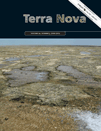
TERRA NOVA
Pioneering Insights into Geology and BeyondTERRA NOVA, published by WILEY, is a leading journal in the field of Geology, with a remarkable impact within the academic community. With the ISSN 0954-4879 and E-ISSN 1365-3121, the journal has been a pivotal platform for innovative research since its inception in 1989 and will continue its influence through to 2024. Ranked in the top tier (Q1) of its category for 2023, TERRA NOVA holds an esteemed position with a Scopus ranking of 67 out of 321 in Earth and Planetary Sciences, showcasing its dedication to high-quality, impactful scientific discourse. The journal covers a diverse range of topics within geology, providing valuable insights for environmental scientists, geologists, and industry professionals. By fostering an interdisciplinary approach, TERRA NOVA remains committed to advancing the understanding of geological processes and their implications for society. With a dedicated readership of researchers, professionals, and students, this journal is essential for those looking to stay abreast of the latest developments and trends in the field.

Geodynamics & Tectonophysics
Bridging Disciplines for a Deeper Understanding of EarthGeodynamics & Tectonophysics, published by the esteemed Russian Academy of Sciences, Siberian Branch, Inst Earths Crust, is a pivotal open-access journal that has been contributing to the scientific discourse on Earth's dynamic processes since 2010. With an ISSN of 2078-502X, this journal serves as a vital platform for researchers and professionals interested in the fields of Earth-Surface Processes, Economic Geology, Geology, and Geophysics, holding a Q3 ranking in each of these categories as of 2023. The journal is based in Irkutsk, Russia, and encompasses a broad spectrum of topics, fostering interdisciplinary collaboration and innovation. Researchers can access cutting-edge studies and insights, engaging with a community committed to advancing our understanding of geodynamics and tectonic phenomena. With a sustained commitment to quality and accessibility, Geodynamics & Tectonophysics plays a critical role in addressing pressing geological concerns and advancing global geological research.

JOURNAL OF IBERIAN GEOLOGY
Exploring the depths of Iberian geology and stratigraphy.JOURNAL OF IBERIAN GEOLOGY, published by Springer International Publishing AG, is a pivotal platform dedicated to advancing the field of geology and stratigraphy. With an ISSN of 1698-6180 and E-ISSN of 1886-7995, this journal has earned its reputation in the academic community, holding a commendable Q2 ranking in both Geology and Stratigraphy for 2023, reflecting its contributions to contemporary geological research. Spanning from 2007 to 2024, it provides a comprehensive forum for scholars and practitioners from around the globe to disseminate their findings pertaining to the Iberian Peninsula, enhancing the understanding of regional geological phenomena. The journal has carved out a significant niche within the Earth and Planetary Sciences, ranking #137 out of 321 in Geology and #24 out of 55 in Stratigraphy, indicating its wide-reaching impact and scholarly engagement. The Journal of Iberian Geology serves as an indispensable resource for those interested in the complexities of geological structures, stratigraphic sequences, and the broader implications of geological research, making it a vital reference for researchers, professionals, and students alike.
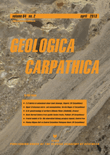
GEOLOGICA CARPATHICA
Unlocking the Secrets of the Carpathian RegionGEOLOGICA CARPATHICA, with ISSN 1335-0552 and E-ISSN 1336-8052, is a distinguished open access journal published by the Slovak Academy of Sciences Geological Institute, serving as a pivotal platform for the dissemination of research in the field of Geology. Established in 1991 and continuing through 2024, the journal is recognized for its significant contributions to Earth and Planetary Sciences, evidenced by its 2023 Scopus ranking placing it in the second quartile (Q2) within Geology. With an H-index that showcases its impactful publications, GEOLOGICA CARPATHICA is committed to fostering scholarly communication while promoting accessible research, having adopted an open access model since 2009. Located in beautiful Bratislava, Slovakia, this journal aims to engage a global audience of researchers, professionals, and students interested in ecological, geological, and environmental studies, making it a prominent resource for enriching the scientific community's understanding of the Carpathian region and beyond.
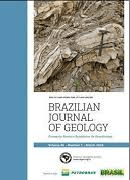
Brazilian Journal of Geology
Fostering Excellence in Geoscientific ResearchBrazilian Journal of Geology, the flagship publication of the SOC BRASILEIRA GEOLOGIA, has been a beacon of geoscientific research since its inception in 2013. With an ISSN of 2317-4889 and an E-ISSN of 2317-4692, this open-access journal has facilitated the dissemination of high-quality research across various branches of geosciences, making it freely accessible to a global audience since 2014. Hailing from Brazil, the journal proudly holds a Q2 ranking in Earth and Planetary Sciences as of 2023, and ranks #73 out of 195 in Scopus, indicating its growing impact and relevance in the field. The Brazilian Journal of Geology aims to bridge diverse geological studies with interdisciplinary approaches, promoting the understanding and application of geology in addressing contemporary scientific challenges. As it converges research from 2013 to 2024, the journal not only enriches the academic landscape but also serves as a vital resource for researchers, professionals, and students eager to explore the complexities of the Earth and its processes.

Acta Geodynamica et Geomaterialia
Fostering Scholarly Exchange in Geophysics and GeotechnicsActa Geodynamica et Geomaterialia is a well-regarded journal published by the Academy of Sciences of the Czech Republic, Institute of Rock Structure and Mechanics. Since its inception in 2004, this journal has established itself as a vital resource within the realms of Geology, Geophysics, and Geotechnical Engineering, categorized in the Q3 quartile across these fields as of 2023. With a focus on innovative research that addresses complex Earth dynamics and material behavior, it provides a platform for scholars and professionals to disseminate their findings and foster academic discourse. The journal holds an important position in the academic landscape, particularly for those engaged in interdisciplinary studies bridging geology and engineering. Although it is not an open access publication, its content remains pivotal for advancing knowledge and practices within these areas, making it an essential read for researchers and students alike. The journal's operational address is located in the vibrant city of Prague, Czech Republic, further enriching its academic character.